高中英语语法惯用法:如何用英语表示“身体”
高中英语语法重要知识点
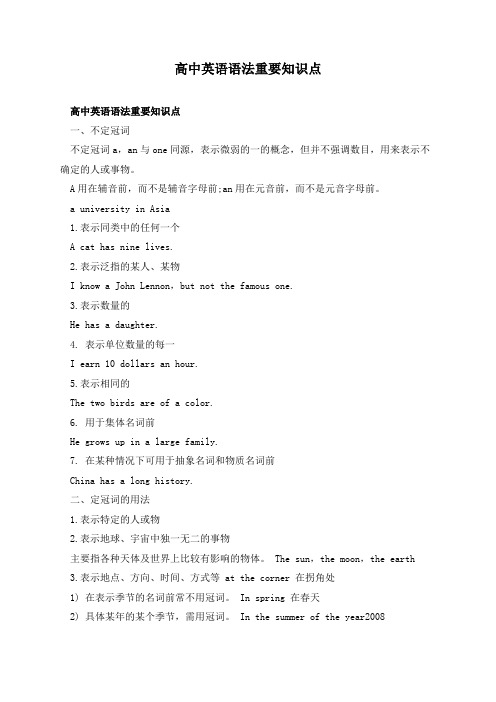
高中英语语法重要知识点高中英语语法重要知识点一、不定冠词不定冠词a,an与one同源,表示微弱的一的概念,但并不强调数目,用来表示不确定的人或事物。
A用在辅音前,而不是辅音字母前;an用在元音前,而不是元音字母前。
a university in Asia1.表示同类中的任何一个A cat has nine lives.2.表示泛指的某人、某物I know a John Lennon,but not the famous one.3.表示数量的He has a daughter.4. 表示单位数量的每一I earn 10 dollars an hour.5.表示相同的The two birds are of a color.6. 用于集体名词前He grows up in a large family.7. 在某种情况下可用于抽象名词和物质名词前China has a long history.二、定冠词的用法1.表示特定的人或物2.表示地球、宇宙中独一无二的事物主要指各种天体及世界上比较有影响的物体。
The sun,the moon,the earth 3.表示地点、方向、时间、方式等 at the corner 在拐角处1) 在表示季节的名词前常不用冠词。
In spring 在春天2) 具体某年的某个季节,需用冠词。
In the summer of the year20083)用于序数词或形容词的最高级前 the first the second4)用于形容词前使其名词化 the rich the poor5)用于复数姓氏前,表示―夫妇‖或全家 The Smiths6)用于乐器名词前 Play the piano7)用于by+the+计量单位名词 By the pound1. 用于复数名词前复数名词泛指某类人或物时,其前通常用零冠词。
Students should obey the school rules. 学生应该遵守校规。
名校版高考高中英语语法详解 Something惯用法
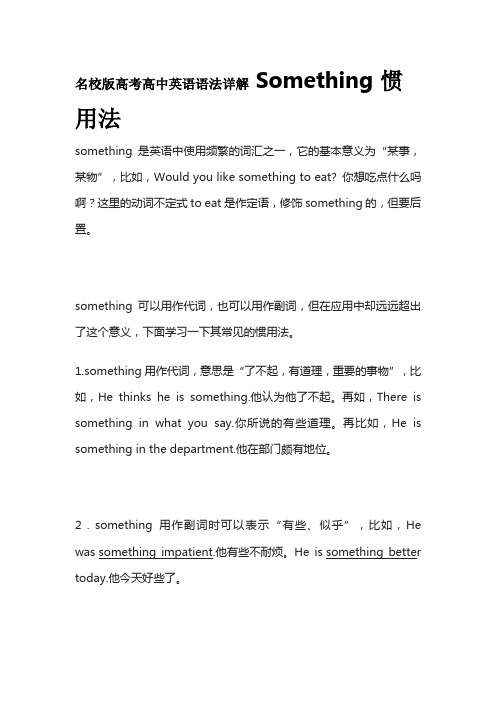
名校版高考高中英语语法详解Something惯用法something是英语中使用频繁的词汇之一,它的基本意义为“某事,某物”,比如,Would you like something to eat? 你想吃点什么吗啊?这里的动词不定式to eat是作定语,修饰something的,但要后置。
something可以用作代词,也可以用作副词,但在应用中却远远超出了这个意义,下面学习一下其常见的惯用法。
1.something用作代词,意思是“了不起,有道理,重要的事物”,比如,He thinks he is something.他认为他了不起。
再如,There is something in what you say.你所说的有些道理。
再比如,He is something in the department.他在部门颇有地位。
2.something用作副词时可以表示“有些、似乎”,比如,He was something impatient.他有些不耐烦。
He is something better today.他今天好些了。
3.搭配or something的意思是“……之类的人,东西或情况”,表示对所陈述的对象不十分肯定,比如,He is the wool merchant or something.他是个羊毛商之类的人。
再比如,He is a teacher or something.他大概是个当老师的。
再比如,I hear he has broken an arm or something.我听说他断了一只手臂什么的。
4.something of表示“在某种意义或程度上……,有几分,有些像”等等,比如,The city proved to be something of a disappointment.结果这座城市证明有点儿令人失望。
再比如,The soldiers found himself something of a hero when he returned to his village.那个士兵回到村里时,发现人们有几分把它当做英雄看待。
高考英语情态动词语法知识点与用法
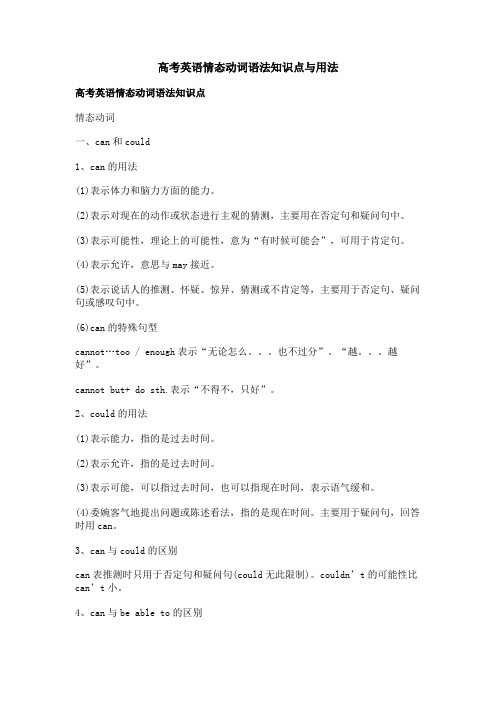
高考英语情态动词语法知识点与用法高考英语情态动词语法知识点情态动词一、can和could1、can的用法(1)表示体力和脑力方面的能力。
(2)表示对现在的动作或状态进行主观的猜测,主要用在否定句和疑问句中。
(3)表示可能性,理论上的可能性,意为“有时候可能会”,可用于肯定句。
(4)表示允许,意思与may接近。
(5)表示说话人的推测、怀疑、惊异、猜测或不肯定等,主要用于否定句、疑问句或感叹句中。
(6)can的特殊句型cannot…too / enough表示“无论怎么。
也不过分”。
“越。
越好”。
cannot but+ do sth.表示“不得不,只好”。
2、could的用法(1)表示能力,指的是过去时间。
(2)表示允许,指的是过去时间。
(3)表示可能,可以指过去时间,也可以指现在时间,表示语气缓和。
(4)委婉客气地提出问题或陈述看法,指的是现在时间。
主要用于疑问句,回答时用can。
3、can与could的区别can表推测时只用于否定句和疑问句(could无此限制)。
couldn’t的可能性比can’t小。
4、can与be able to的区别(1)现在时:无区别,但后者不常用。
(2)完成时;can没有完成时,此时要用have(has,had)been able to。
(3)将来时:can没有将来时,要用will be able to。
(4)过去时:could表示一般能力,was/were able to 表示在具体场合通过努力成功做成某事的能力。
二、may 和might1、may的用法(1)表示询问或说明一件事可不可以做。
(2)表示一件事或许会发生或某种情况可能会存在,通常用在肯定句和否定句中。
注意:表示可能性时,can’t语气强,表示“不可能”,may not语气弱,表示“可能不”。
2、might的用法(1)表示询问或允许,指的是过去时间。
(2)表示可能发生的事,可以指过去时间,也可以指现在时间,语气更加不肯定,可能性比may小一些。
高中英语语法知识点总结
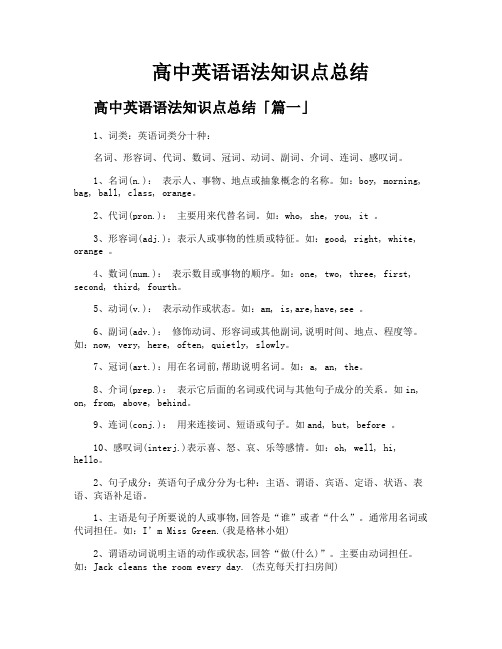
高中英语语法知识点总结高中英语语法知识点总结「篇一」1、词类:英语词类分十种:名词、形容词、代词、数词、冠词、动词、副词、介词、连词、感叹词。
1、名词(n.):表示人、事物、地点或抽象概念的名称。
如:boy, morning, bag, ball, class, orange。
2、代词(pron.):主要用来代替名词。
如:who, she, you, it 。
3、形容词(adj.):表示人或事物的性质或特征。
如:good, right, white, orange 。
4、数词(num.):表示数目或事物的顺序。
如:one, two, three, first, second, third, fourth。
5、动词(v.):表示动作或状态。
如:am, is,are,have,see 。
6、副词(adv.):修饰动词、形容词或其他副词,说明时间、地点、程度等。
如:now, very, here, often, quietly, slowly。
7、冠词(art.):用在名词前,帮助说明名词。
如:a, an, the。
8、介词(prep.):表示它后面的名词或代词与其他句子成分的关系。
如in, on, from, above, behind。
9、连词(conj.):用来连接词、短语或句子。
如and, but, before 。
10、感叹词(interj.)表示喜、怒、哀、乐等感情。
如:oh, well, hi, hello。
2、句子成分:英语句子成分分为七种:主语、谓语、宾语、定语、状语、表语、宾语补足语。
1、主语是句子所要说的人或事物,回答是“谁”或者“什么”。
通常用名词或代词担任。
如:I’m Miss Green.(我是格林小姐)2、谓语动词说明主语的动作或状态,回答“做(什么)”。
主要由动词担任。
如:Jack cleans the room every day. (杰克每天打扫房间)3、表语在系动词之后,说明主语的身份或特征,回答是“什么”或者“怎么样”。
代词考点讲义15反身代词和相互代词高频知识点用法总结- 新高考高中英语语法二轮复习

新高考高中英语语法二轮复习【全国通用】代词考点讲义15【精讲版】反身代词和相互代词高频知识点用法总结常考用法2. 反身代词的句法功能(1) 反身代词用作同位语反身代词主要用于加强被修饰词的语气,通常紧放在被修饰名词或代词后,或放在句末。
如:I prefer to do the work myself. 我宁愿自己干这工作。
I myself heard him say so yesterday. 我昨天亲自听他这么说的。
注意下列句子的区别:I did it myself. 是我亲自做的。
(是我做的,而不是别人做的。
)I did it by myself. 我独自做的。
(我自己做的,没有其他任何人的帮助。
)(2) 反身代词用作宾语反身代词既可用作动词宾语,也可用介词宾语。
如:He appeared to be talking to himself. 他仿佛在跟自己讲话。
I don’t blame you; I blame myself.我不怪你,我怪我自己。
注意,当宾语与句子主语指同一个人或事物时,动词后的宾语不能用宾格代词,而应用反身代词。
如:当我在镜子里看到自己时,我大为震惊。
误:I got such a shock when I saw me in the mirror.正:I got such a shock when I saw myself in the mirror.(3) 反身代词用作表语反身代词有时可以表示主语和表语为同一人或同一事物。
如:The poor boy was myself. 那个可怜的孩子就是我自己。
注意,反身代词用于 be, feel, seem, look 等后作表语,还可表示身体或精神处于正常状态。
如:I don’t know what’s the matter with me. I’m not myself today.我不知道是怎么啦。
今天我感到不舒服。
3. 反身代词用于习语反身代词在一些习语中的用法值得注意。
(完整版)高中英语语法整理

目录:................................................................................................................... 错误!未定义书签。
1.代词 (2)2.冠词 (8)3.数词 (10)4.名词 (10)5.形容词 (14)6.副词 (14)7.独立主格 (18)8.With的复合结构 (18)9.连词 (19)10.动词 (20)11.系动词 (21)12.助动词 (21)13.情态动词 (22)14.短语动词 (25)15.非谓语动词 (25)补充:worth的用法 (28)16.动词的时态 (32)17.动词的语态 (40)18.主谓一致 (43)19.虚拟语气 (49)20.祈使句 (54)21.反意疑问句 (56)22.倒装 (59)23.定语从句 (61)24.名词性从句 (65)25.状语从句 (69)1.代词1)人称代词的主格在句子中作主语或主语补语。
例如:John waited a while but eventually he went home.约翰等了一会儿,最后他回家了。
说明:在复合句中,如果主句和从句主语相同,代词主语要用在从句中,名词主语用在主句中,例如:When he arrived, John went straight to the bank. 约翰一到就直接去银行了。
2)人称代词的宾格在句子中作宾语或介词宾语,但在口语中也能作主语补语,第一人称在省略句中,还可以作主语。
例如:I saw her with them, at least, I thought it was her. 我看到她和他们在一起,至少我认为是她。
(her做宾语,them做介词宾语,her作主语补语)说明:在上面两例句中,her作主语补语。
现代英语中多用宾格,在正式文体中这里应为she。
名校版高考高中英语语法详解 不定代词some及其他

名校版高考高中英语语法详解不定代词some及其他some及somebody,someone,something是英语学习和使用中最常见到的不定代词。
some和后面三个单词有什么关系,它们都在什么情况下使用是今天的重点。
1.some多用于肯定句,它的意思为“一些,有些”它在句子当中做主语.比如:Some of it is good,其中一部分是好的。
Some of these books are useful.这些书籍有的很有用处。
some还可以做宾语。
比如:If you have any,please give us some.如果你有的话,请给我们一点。
some可以用作介词的宾语。
比如:They don’t agree with some of what I say.他们不同意我所说的一部分。
some和后缀-thing、-body、-one构成合成词,即,something、somebody和someone它们的用法跟some的用法基本相同。
2.something的意思是“某物,某事;几分”,它在句子当中可以用作主语。
比如:Something unexpected occurred.发生了一件出乎意料的事There is something on the ground.地上有一样东西。
Something is better than nothing.有比没有好。
There's something wrong with the TV set。
电视机什么地方出毛病了。
something也可以用作表语。
比如:She is something of an poet.她有几分诗人的才能。
He is something of a musician.他有点音乐知识。
something还可以在句中用作宾语。
比如:I remember something.我想起了一件事。
He whispered something in her ear.他在她耳边低声说了些什么。
高中三年所有英语语法考点最全汇总 (1)

专题一定语从句一、关系代词引导的定语从句1、that 指人或物在从句中作主语,宾语或表语which 指物在从句中作主语,宾语或表语(作宾语时可以省略)who 指人在从句中作主语,宾语或表语whom 指人在从句中作宾语whose 指人或物在从句中作定语as 指人或物在从句中作主语,宾语或表语but 指人或物在从句中作主语,宾语或表语注意:指物时,whose+名词=the+名词+of which 或 of which+the+名词2、as 的用法(1)常用于下列结构:such…as; so…as;the same…as; as…as注意:the same…as 表示同一类,不同一个the same…that 表示同一个(2)as 与 which 的区别a、位置不同as 可放在主句后,主句前或主句中间;which 只能放在主句后。
b、as 起连接作用,表达说话人的观点、看法,并指出主句内容的根据或出处,意为“正如,正像”。
Which 相当于并列句,可以用 and this 来代替,意为“这一点,这件事’”。
注意:as 常用于下列结构:as we know/ as is known to all, as we all can see, as has been said before/above, as might be excepted, as is often the case, 一般不能用 which 代替 as。
c、在从句中作主语时,which 既可作系动词 be 的主语也可作实义动词的主语,而 as 只可作系动词 be 的主语。
二、只用 that 不用 which 的情况1、.先行词为 all , much, everything, nothing , something ,anything, nothing, none, the one 等不定代词时2、先行词被 only, any, few, little, no , all, just , very ,right 等修饰时.3、当先行词是最高级或被形容词最高级修饰时。
身体部位英语表达
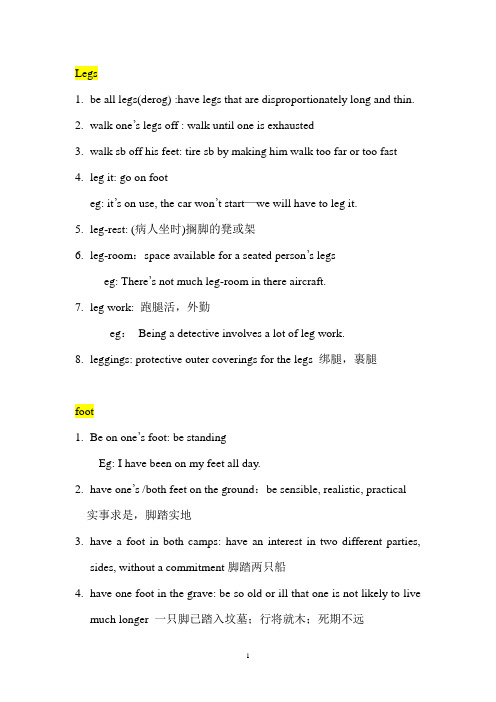
Legs1.be all legs(derog) :have legs that are disproportionately long and thin.2.walk one’s legs off : walk until one is exhausted3.walk sb off his feet: tire sb by making him walk too far or too fast4.leg it: go on footeg: it’s on use, the car won’t start—we will have to leg it.5.leg-rest: (病人坐时)搁脚的凳或架6.leg-room:space available for a seated person’s legseg: There’s not much leg-room in there aircraft.7.leg work: 跑腿活,外勤eg:Being a detective involves a lot of leg work.8.leggings: protective outer coverings for the legs 绑腿,裹腿foot1.Be on one’s foot: be standingEg: I have been on my feet all day.2.have one’s /both feet on the ground:be sensible, realistic, practical实事求是,脚踏实地3.have a foot in both camps: have an interest in two different parties,sides, without a commitment脚踏两只船4.have one foot in the grave: be so old or ill that one is not likely to livemuch longer 一只脚已踏入坟墓;行将就木;死期不远5.on one’s feet: completely recovered from an illness or a set-back(患病或遭挫折后)完全复原eg: After his wife’s death, it took him two years to get back on his feet. Only our party’s policies will put our country on it feet again.6.put one’s foot down: be very firm in opposing sth which sb wishes todo 坚决反对某人向做某事eg:Mother let us go to the party, but when it came to staying oveernight, she put her foot down firmly.7.put a foot wrong: (esp in negative sentences)make a mistake做错事eg:I’ve never known him to put a foot wrong, no matter how delicate the issue.8.rush/run sb (clean) off his feet: make sb work very hard ormoveabout a lot, so making him exhausted 把某人累坏了,使某人疲于奔命eg:Before Christmas the shop assitants are rushed off their feet.9.stand on one’s own (two) feet: be independend and be able to take careof oneself独立自主,自立eg:Now that you’re growing up you must learn to stand on your own two feet.10.f ind one’s feet:(1)能够站稳,能够走稳eg: After six-week illness ittook me some time to find my feet again.(2)能够独立而有信心地行动:I only recently joined the firm, so I am still finding my feet.11.t en feet tall: be pleased and proud of oneself 沾沾自喜,自鸣得意eg:be/feel/seem/look ten feet tall12.u nder one’s feet : disturbing one and being a nuisance 碍手碍脚,讨厌eg:The children are under my feet all day.13.g et/have cold feet: become/be afraid or reluctant to do sth 临阵退缩或胆怯eg: He got cold feet at the last feet.14.(not) let the grass grow under one’s feet: (not) delay in getting sthdone 做事(不)拖拉15.h ave/get itchy feet: feel a restless desire to travel or move from placeto place16.foot-bridge 步行桥,人行桥17.f ootlights:row lights along the front of the stage in a theare脚灯(舞台前面的一排灯)18.f ootsore:脚酸的,脚疼的(尤指因走长路而引起的)arm1.at arm’s length : with the arm fully extended away from the body 以一臂之距2.the (long) arm of the law: (extent of ) the authority or power of the law法律的权利或力量的限度eg: He fled to Brazil trying to escape the long arm of the law.3.fold sb/sth in one’s arms 抱住某人某物eg: Father folded the tinychild in his arms.4.have a long arm: be able to make one’s power or authority felt even ata distance 有深远的影响力或势力5.keep sb at arm’s length 与某人保持距离,不使自己太亲近某人6.with arms akimbo 双手叉腰7.arm-band 臂环,臂章,袖章8.armpit 腋窝head1.Over/above one’s head too difficult to understand 难以理解,eg:The lecture went/was away above my head2.bang,etc one’s head against a brick wall continue vainly trying to achieve sth in spite of several unsuccessful attempts 以头撞墙(尽管屡次失败,仍然枉费心机地试图做成某事);徒劳无益3.be/stand head and shoulders above sb/sth be very much better, cleverer,etc than (others) 比他人好,聪明…得多;鹤立鸡群4.Bring sth/ come to a head bring sth to/reach a climax 使某事物达到顶点eg: The atmosphere in the office had been tense for some time but this ltest dismissal brought matters to a head.5. by a short head (a) (in horse-racing) by a distance of less than thelength of a horse’s head:win /lose by a short head (b)by only alittle 以极少的量:I got 96, he got 94, so I beat him by a short head.6. drive sth into one’s head make sb remember sth, esp with difficulty 尤指费力地让某人记住某事7.from head to foot/toe 从头到脚,全身The children were covered in mud from head to toe.8. get it into one’s head that…understand fully…; realize…成分了解到;认识到:I wish he’d get it into his head that exams are important.9.give sb his head let sb move or act freely 让某人随意而为10.g o to one’s head (a) (of alcoholic drink ) make one dizzy or slightlydrunk 指酒上头,使人有醉意:The whisky went straight to my head.(b) of success make one conceited or too confident指成功使人自负或过于自信:All that praise has really gone to my head.11.h ave a good, etc head of hair 有一头浓密的头发12.h ave a good head on one’s shoulders 有实际能力,常识等13.h ave one’s head in the cleouds have one’s thought far away; beday-dreaming 想入非非,做白日梦14.h ead first (a) (of plunging, etc)with one’s head before the rest of one’sbody (跳水等)头在前:She fell head first down the stairs.她摔倒了,一头栽下楼梯。
学习用表达身体部位

学习用表达身体部位在学习一门外语时,掌握身体部位的表达是非常重要的一部分。
无论是在日常生活中与人交流,还是在医疗、健康等领域,我们都需要准确地描述身体的不同部位。
本文将介绍一些常用的身体部位表达方式,并提供一些实用的例句以供参考。
1. 头部(Head)头部是人体最上方的部分,包括头发、脸颊、眼睛、耳朵等。
头发(Hair)- My hair is blonde.(我的头发是金色的。
)- She has long curly hair.(她有长卷发。
)脸颊(Cheek)- He has rosy cheeks.(他的脸颊红润。
)- She kissed his cheek gently.(她轻轻地吻了他的脸颊。
)眼睛(Eyes)- His eyes are blue.(他的眼睛是蓝色的。
)- She blinked her eyes in surprise.(她惊讶地眨了眨眼睛。
)耳朵(Ears)- His ears are pierced.(他的耳朵上有耳洞。
)- She covered her ears to block out the noise.(她捂住耳朵以阻止噪音。
)2. 上半身(Upper Body)上半身是指从头到腰部的部分,包括颈部、肩膀、胸部和背部等。
颈部(Neck)- She wore a necklace around her neck.(她戴着一条项链在她的脖子上。
)- He massaged his stiff neck.(他按摩了一下僵硬的脖子。
)肩膀(Shoulders)- Her shoulders are broad.(她的肩膀宽阔。
)- He shrugged his shoulders.(他耸了耸肩。
)胸部(Chest)- He has a muscular chest.(他有一块肌肉发达的胸肌。
)- She placed her hand on her chest, feeling her heart pounding.(她把手放在胸口,感受到自己的心脏怦怦直跳。
高中英语语法专题形容词与必背短语

高中英语语法专题形容词与必背短语高中英语语法专题形容词一、概念说明人或者事物的特征、性质或状态,常用来修饰名词或不定代词的词叫做形容词。
二、形容词在句子中的成分形容词在句子中通常可以做定语、表语、宾语补足语。
1. 形容词做定语(修饰名词或者代词)例如:The lovely hat is mine. 这个可爱的帽子是我的。
I have something important to tell you. 我有重要的事情要告诉你。
2. 形容词做表语,组成主系表结构例如:She looks young. 她看上去很年轻。
3. 形容词作宾语补足语例如:Lucy wants to make herself beautiful. Lucy想让自己变得漂亮。
三、形容词的原级、比较级、最高级1 形容词原级①与形容词原级连用的副词有:very、so、too、enough、quite等。
例如:It’s too cold to g o outside. 外面太冷了,不适合出去。
②形容词原级比较的固定搭配:肯定:A...+as+形容词原级 +as+B例如:Lucy is as clever as Jack. Lucy和Jack一样聪明。
否定:A...+not+as/so+形容词原级+as+B例如:Lucy is not as/so clever as Jack. Lucy不如Jack聪明。
表示倍数:A...+倍数+as+形容词原级+as+B例如:My room is half as big as yours. 我的房间是你房间的一半大。
My room is three times as big as yours. 我的房间是你的三倍大。
2 形容词比较级(两者比较)(1) 固定结构:A...+比较级+than+B例如:Lucy’s room is bigger than yours. Lily的房间比你的大。
The weather of Qingdao is colder than that of Zhejiang in winter. (为避免重复that表示前面提到的weather.) 冬天青岛的天气比浙江冷。
高中英语语法整理总结归纳
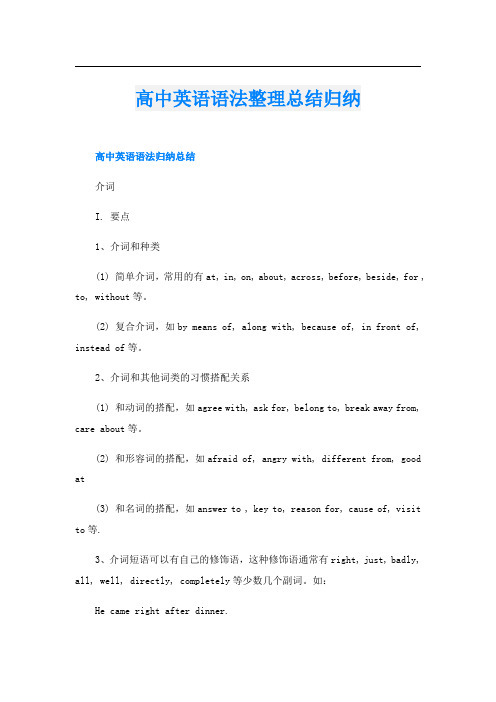
高中英语语法整理总结归纳高中英语语法归纳总结介词I. 要点1、介词和种类(1) 简单介词,常用的有at, in, on, about, across, before, beside, for , to, without等。
(2) 复合介词,如by means of, along with, because of, in front of, instead of等。
2、介词和其他词类的习惯搭配关系(1) 和动词的搭配,如agree with, ask for, belong to, break away from, care about等。
(2) 和形容词的搭配,如afraid of, angry with, different from, good at(3) 和名词的搭配,如answer to , key to, reason for, cause of, visit to等.3、介词短语可以有自己的修饰语,这种修饰语通常有right, just, badly, all, well, directly, completely等少数几个副词。
如:He came right after dinner.He lives directly opposite the school.4、某些介词的意义与用法举例(1) at, on, in(表时间)表示时间点用at,如at four oclock, at midnight等;表示不确定的时间或短期假日也用at,如at that time, at Christmas等。
指某天用on, 如on Monday, on the end of November, 指某天的朝夕用on,如on Friday morning, on the afternoon of September 1st 等。
指长于或短于一天的时段用in,如in the afternoon, in February, in Summer, in 1999等。
英语高中语法笔记(简约版)
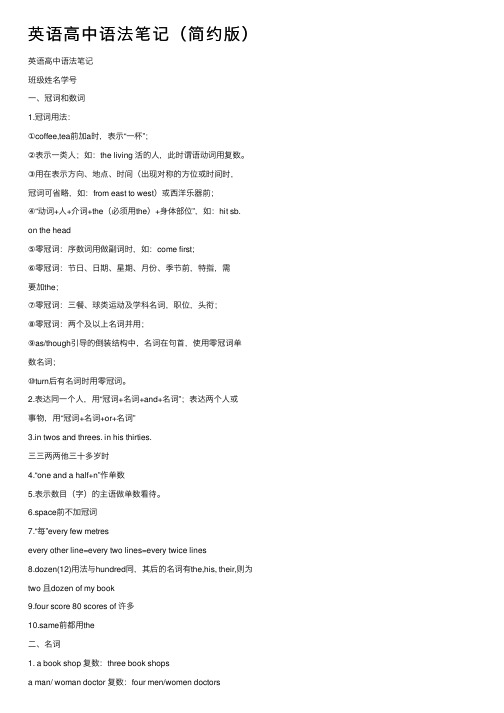
英语⾼中语法笔记(简约版)英语⾼中语法笔记班级姓名学号⼀、冠词和数词1.冠词⽤法:①coffee,tea前加a时,表⽰“⼀杯”;②表⽰⼀类⼈;如:the living 活的⼈,此时谓语动词⽤复数。
③⽤在表⽰⽅向、地点、时间(出现对称的⽅位或时间时,冠词可省略,如:from east to west)或西洋乐器前;④“动词+⼈+介词+the(必须⽤the)+⾝体部位”,如:hit sb.on the head⑤零冠词:序数词⽤做副词时,如:come first;⑥零冠词:节⽇、⽇期、星期、⽉份、季节前,特指,需要加the;⑦零冠词:三餐、球类运动及学科名词,职位,头衔;⑧零冠词:两个及以上名词并⽤;⑨as/though引导的倒装结构中,名词在句⾸,使⽤零冠词单数名词;⑩turn后有名词时⽤零冠词。
2.表达同⼀个⼈,⽤“冠词+名词+and+名词”;表达两个⼈或事物,⽤“冠词+名词+or+名词”3.in twos and threes. in his thirties.三三两两他三⼗多岁时4.“one and a half+n”作单数5.表⽰数⽬(字)的主语做单数看待。
6.space前不加冠词7.“每”every few metresevery other line=every two lines=every twice lines8.dozen(12)⽤法与hundred同,其后的名词有the,his, their,则为two 且dozen of my book9.four score 80 scores of 许多10.same前都⽤the⼆、名词1. a book shop 复数:three book shopsa man/ woman doctor 复数:four men/women doctors2.抽象名词①前不加the ②表⽰具体事物时,变为可数名词,可被a/an修饰3.常见不可数名词:bread, cloth, coffee, cotton, food, fruit, hair,luck, news, sand, tea, water, wealth, weather, wind, traffic, sugar 4.of所有格:表⽰⽆⽣命的名词,但表⽰有⽣命的名词也可,此时,表⽰所有/主谓/动宾关系或事物的来源,如the death of Mao.5.passers-by grown-ups6.question要解答的问题problem 就困难⽽⾔7.fault 指⾏为上的错8.lose interest in have an interest in 特殊9.luggage 不可数三、代词1.⼈称代词充当主语时顺序:单数形式(⼆,三,⼀)you,he and I复数形式(⼀,⼆,三)we,you and they注:第⼀⼈称放在前⾯情况:①在承认错误,承担责任时;②长辈对晚辈,上级对下级2.those (…) who/which…中those不可⽤these代替。
高中英语2025届高考语法复习情态动词与虚拟语气知识讲解
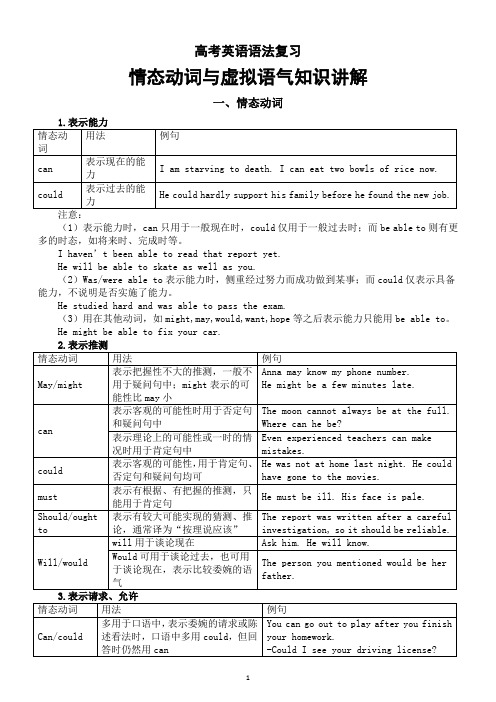
高考英语语法复习情态动词与虚拟语气知识讲解一、情态动词(1)表示能力时,can只用于一般现在时,could仅用于一般过去时;而be able to则有更多的时态,如将来时、完成时等。
I haven’t been able to read that report yet.He will be able to skate as well as you.(2)Was/were able to表示能力时,侧重经过努力而成功做到某事;而could仅表示具备能力,不说明是否实施了能力。
He studied hard and was able to pass the exam.(3)用在其他动词,如might,may,would,want,hope等之后表示能力只能用be able to。
He might be able to fix your car.(1)must还可以表示质问或感情色彩,意为“偏要,偏偏”。
Why must it snow on Saturday?(2)should还可以表示惊奇、愤怒、失望等特殊情感,尤其用在以why,who,how等开头的疑问句中或某些感叹句中。
why should you be so late today?(1)must作“必须”讲的一般疑问句,其肯定回答用must,否定回答用needn’t或don’t have to。
-Must I pay now?-Yes, you must./No, you needn’t.(2)need还可以作实义动词,有人称和数的变化,后跟带to的不定式作宾语。
She needed to go out for a walk.(1)两者在表示过去的习惯动作或行为时常可通用。
When we were children, we would/used to go skating every winter.(2)Used to与would都不能与表示具体频率、次数的词及特定的时间状语或具体的一段时间连用。
高中英语语法知识点

高中英语语法知识点对知识的渴求是人类的自然意向,任何头脑健全的人都会为获取知识而不惜一切。
下面小编给大家分享一些高中英语语法知识,希望能够帮助大家,欢迎阅读!高中英语语法知识1定语从句一、关系代词引导的定语从句1、that 指人或物在从句中作主语,宾语或表语which 指物在从句中作主语,宾语或表语(作宾语时可以省略)who 指人在从句中作主语,宾语或表语whom 指人在从句中作宾语whose 指人或物在从句中作定语as 指人或物在从句中作主语,宾语或表语but 指人或物在从句中作主语,宾语或表语注意:指物时,whose+名词=the+名词+of which或of which+the+名词2、as 的用法(1)常用于下列结构:such…as; so…as;the same…as; as…as注意:the same…as 表示同一类,不同一个the same…that 表示同一个(2)as与which的区别a、位置不同as可放在主句后,主句前或主句中间;which只能放在主句后。
b、as起连接作用,表达说话人的观点、看法,并指出主句内容的根据或出处,意为“正如,正像”。
Which相当于并列句,可以用and this来代替,意为“这一点,这件事’”。
注意:as常用于下列结构:as we know/ as is known to all, as we all can see, as has been said before/above,as might be excepted, as is often the case, 一般不能用which代替as。
c、在从句中作主语时,which既可作系动词be的主语也可作实义动词的主语,而as只可作系动词be的主语。
二、只用that不用which的情况1、.先行词为all , much, everything, nothing , something ,anything, nothing, none, the one等不定代词时2、先行词被only, any, few, little, no , all, just , very ,right等修饰时.3、当先行词是最高级或被形容词最高级修饰时。
英语中身体部位的表达法讲解与专项练习

英语中身体部位的表达法讲解与专项练习
引言
在英语中,我们需要掌握身体部位的表达法,以便在交流中能够清晰表达自己的意思。
本文档将为您讲解英语中身体部位的常用表达法,并提供专项练,帮助您加深记忆和理解。
身体部位的表达法
以下是一些常用的身体部位表达法:
1. 头部:head
2. 脖子:neck
3. 肩膀:shoulder
4. 背部:back
5. 腰部:waist
6. 手臂:arm
7. 手肘:elbow
8. 手腕:wrist
9. 手:hand
10. 手指:finger
11. 大腿:thigh
12. 腿:leg
13. 膝盖:knee
14. 脚踝:ankle
15. 脚:foot
16. 脚趾:toe
专项练
请根据下列描述,选择合适的身体部位表达法填入空白处。
1. I hurt my __ when I fell down the stairs.
2. She broke her __ while playing soccer.
3. He has a tattoo on his __.
4. My __ is sore from exercising too much.
5. She twisted her __ playing basketball.
答案:
1. leg
2. arm
3. back
4. waist
5. ankle
总结
通过研究本文档,您应该对英语中身体部位的表达法有了更深入的认识。
请务必进行专项练来加强记忆,并在实际交流中运用所学知识。
身体 英语口语

身体英语口语摘要:一、身体部位的英语表达1.头部2.颈部3.躯干4.上肢5.下肢二、身体动作的英语表达1.走和跑2.站和坐3.躺和起4.举手和抬脚三、身体疾病的英语表达1.常见疾病2.症状描述四、身体感觉的英语表达1.疼痛2.温度感觉3.视觉和听觉4.嗅觉和味觉五、保持身体健康的英语表达1.健康生活方式2.锻炼和运动3.健康饮食正文:身体是我们生活的基础,因此了解身体部位、动作、疾病和感觉的英语表达是非常实用的。
接下来,我们将分五个部分来学习这些表达。
一、身体部位的英语表达1.头部:head、eyes、ears、nose、mouth、teeth、neck 等。
2.颈部:neck。
3.躯干:torso、chest、back、stomach、hips 等。
4.上肢:upper limbs、arms、shoulders、elbows、wrists、hands、fingers 等。
5.下肢:lower limbs、legs、thighs、knees、ankles、feet、toes 等。
二、身体动作的英语表达1.走和跑:walk、run、stroll、pace、jog 等。
2.站和坐:stand、sit、lie、squat、kneel、sit down、stand up 等。
3.躺和起:lie down、get up、rise、awaken 等。
4.举手和抬脚:raise、lift、put up、lower、drop 等。
三、身体疾病的英语表达1.常见疾病:common diseases、colds、flus、asthma、diabetes、hypertension 等。
2.症状描述:symptoms、aches、pains、aches and pains、aches and discomfort 等。
四、身体感觉的英语表达1.疼痛:pain、ache、discomfort、throbbing、stabbing 等。
身体用英语怎么说
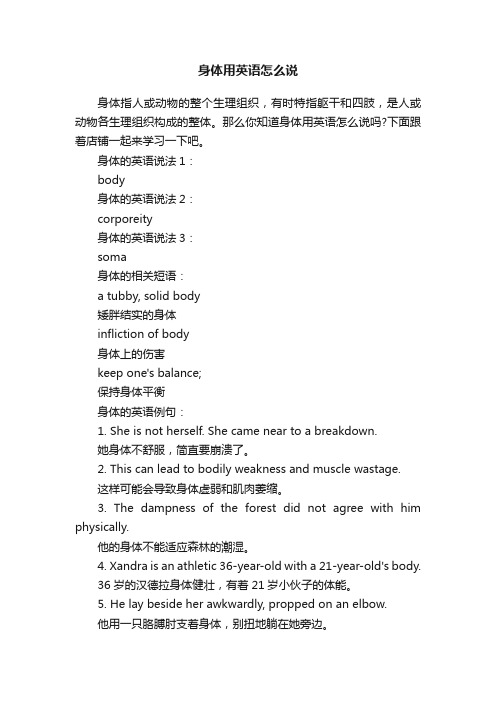
身体用英语怎么说身体指人或动物的整个生理组织,有时特指躯干和四肢,是人或动物各生理组织构成的整体。
那么你知道身体用英语怎么说吗?下面跟着店铺一起来学习一下吧。
身体的英语说法1:body身体的英语说法2:corporeity身体的英语说法3:soma身体的相关短语:a tubby, solid body矮胖结实的身体infliction of body身体上的伤害keep one's balance;保持身体平衡身体的英语例句:1. She is not herself. She came near to a breakdown.她身体不舒服,简直要崩溃了。
2. This can lead to bodily weakness and muscle wastage.这样可能会导致身体虚弱和肌肉萎缩。
3. The dampness of the forest did not agree with him physically.他的身体不能适应森林的潮湿。
4. Xandra is an athletic 36-year-old with a 21-year-old's body.36岁的汉德拉身体健壮,有着21岁小伙子的体能。
5. He lay beside her awkwardly, propped on an elbow.他用一只胳膊肘支着身体,别扭地躺在她旁边。
6. He was not perhaps physically the strongest in the class.他可能不是全班身体最壮的。
7. If your child's temperature rises, sponge her down gently with tepid water.如果你孩子的体温上升,就用海绵蘸上温水轻轻地擦拭她的身体。
8. He developed a nervous twitch and began to blink constantly.他身体出现了神经性抽搐,开始不停地眨眼睛。
- 1、下载文档前请自行甄别文档内容的完整性,平台不提供额外的编辑、内容补充、找答案等附加服务。
- 2、"仅部分预览"的文档,不可在线预览部分如存在完整性等问题,可反馈申请退款(可完整预览的文档不适用该条件!)。
- 3、如文档侵犯您的权益,请联系客服反馈,我们会尽快为您处理(人工客服工作时间:9:00-18:30)。
高中英语语法惯用法:如何用英语表示“身体”
一、表示相对于精神(mind, spirit, soul)的“身体”,可用 body 来表示。
如:
You can imprison my body but not my mind. 你可以禁锢我的身体但不能禁锢我的精神。
His body is old but his mind is young. 他身体虽然老了,但心还很年轻。
注:要表示汉语中的“身心”,英语通常说成body and mind,其词序可以颠倒,即也可说成mind and body。
如:
The girl is pure in body and mind. 这姑娘身心纯洁。
He feels weary in body and mind. 他感到身心疲劳。
She is sound in body and mind [mind and body]. 她身心健康。
另外注意,body and soul也可连用构成习语,不过其意不是“身心”,而是“全心全意地”“完完全全地”,在句中用作副词。
如:
He loves her body and soul. 他真心实意爱她。
He does his work body and soul. 他全心全意地工作。
二、侧重指躯体、躯干等的“身体”,也可用 body 表示。
如:
My body was all aches and pains. 我浑身疼痛。
He wore clothes to keep his body warm. 他穿衣服以暖和身子。
He was badly burned on the face and body. 他的脸部和身上都严重烧伤。
Aspirin is quickly absorbed by [into] the body. 阿司匹林很快被身体吸收了。
The body quickly adjusts (itself) to changes in temperature. 身体迅速(自行)调节以适应气温的变化。
三、表示健康状况的“身体”,一般不能直接用 body, 可改用其他说法(如用 health, healthy, fit, well 等)。
如:
He is in good health. / He is healthy. 他身体健康。
Keep healthy, study well and work well. 身体好,学习好,工作好。
What matters most is good health. 最要紧的是有个好的身体。
You should pay more attention to your health. 你要更注意身体。
If you took more exercise, you might feel healthier. 如果你多锻炼,你可能会感到身体更好。
I do a lot of walking, which keeps me fit. 我经常走很多路,这使我保持身体健康。
If you were in better health, we’d have let you go with us. 你要是身体好一点,我们就让你和我们一道去了。
注:有些汉语中的“身体”,在英语中无需用特定的词来表达,可考虑将其隐在一定的上下文中。
如:
Take care of yourselves. 希望你们注意身体。
How do you feel? / How are you feeling? 你身体感觉怎么样?
How have you been keeping? 你的身体一向如何?
I’ll look in this evening to see how she is. 我今晚去探望她一下,看她身体如何。
I’ve got my medical (examination) on Thursday. 我星期四进行了身体检查。
Being well taken care of, she recovered quickly. 她受到很好的照顾,身体恢复得很快。
